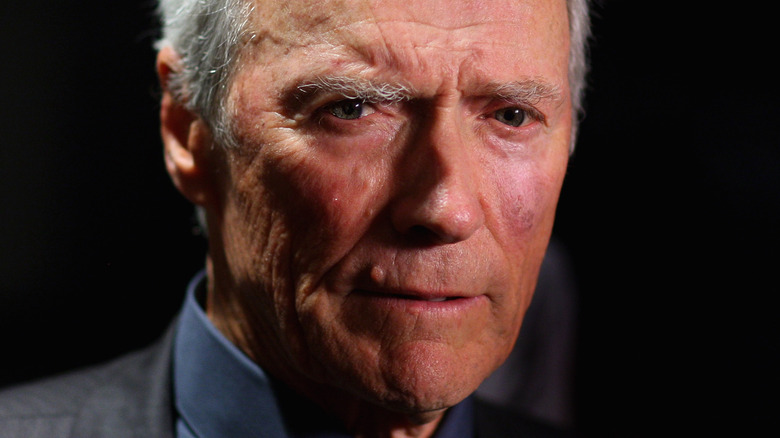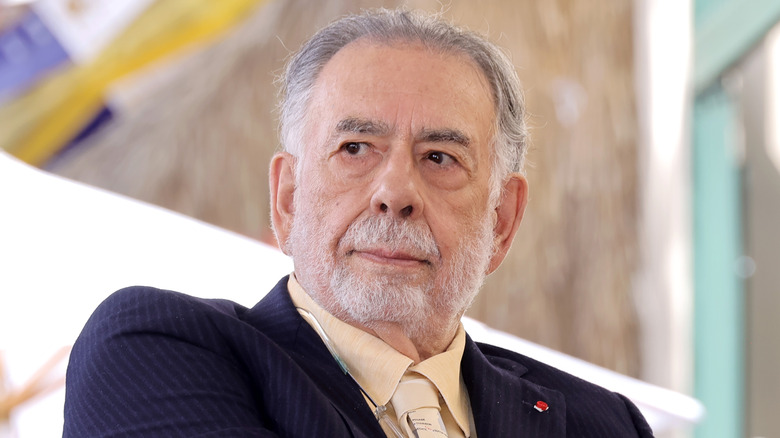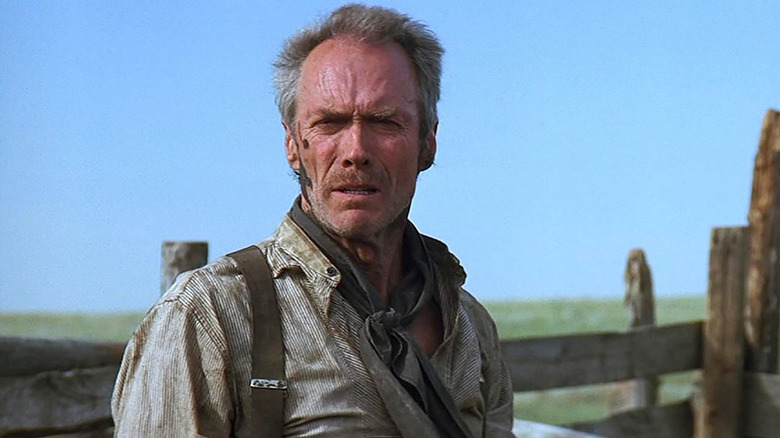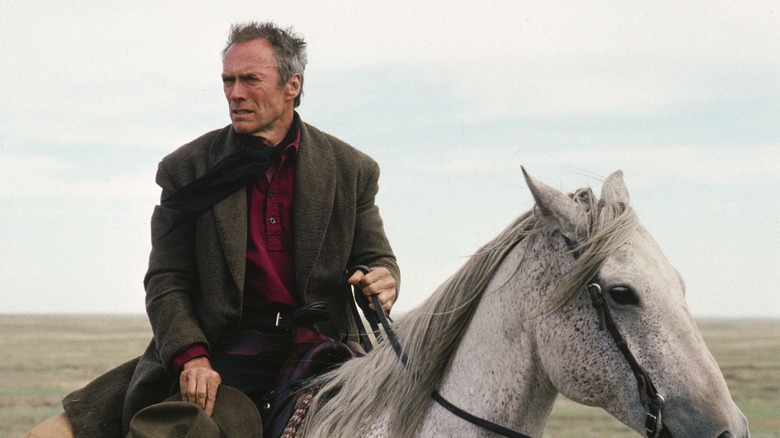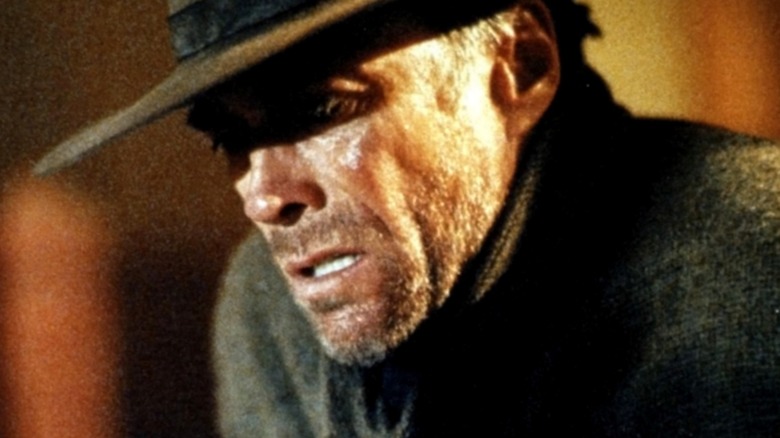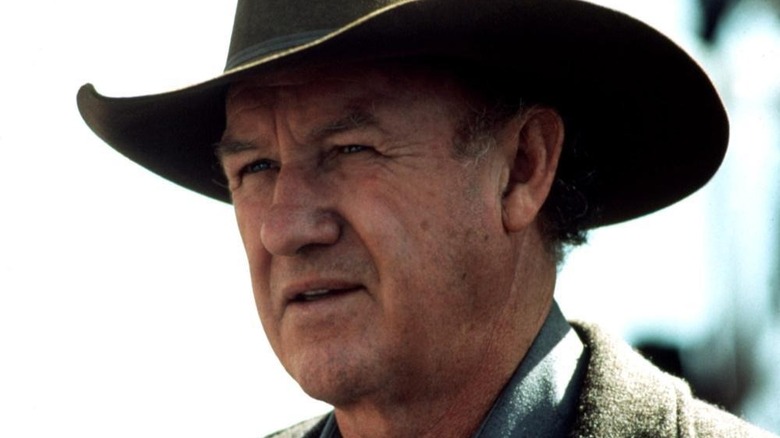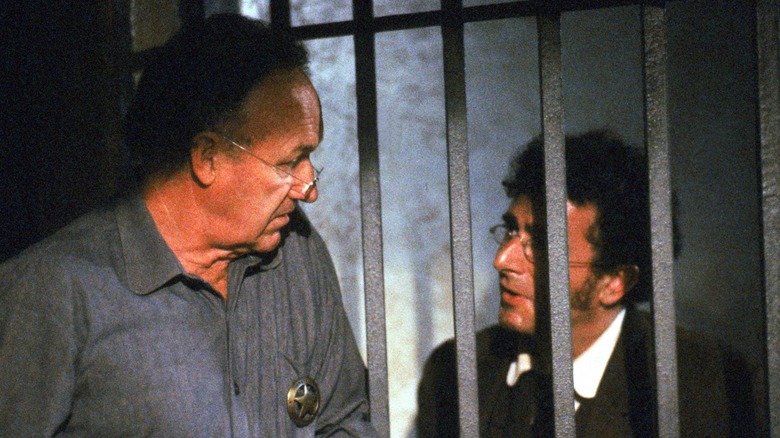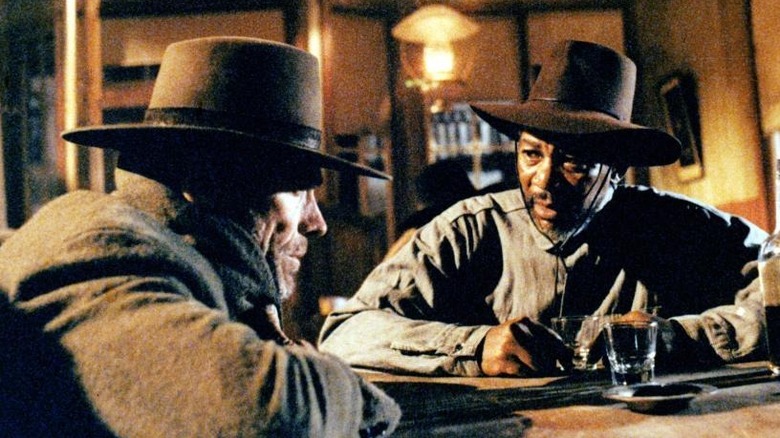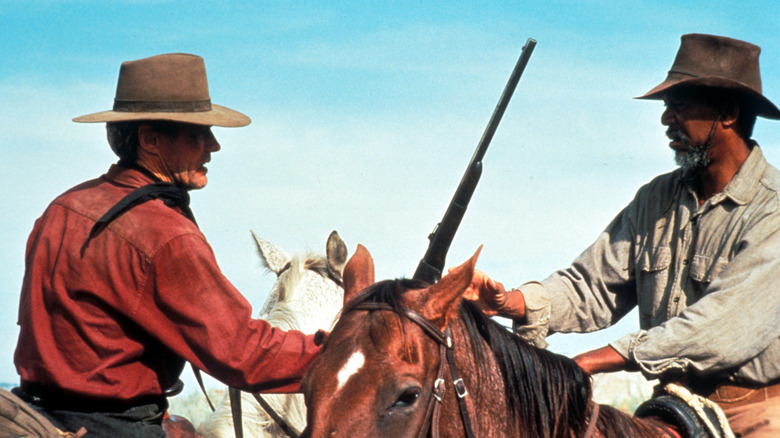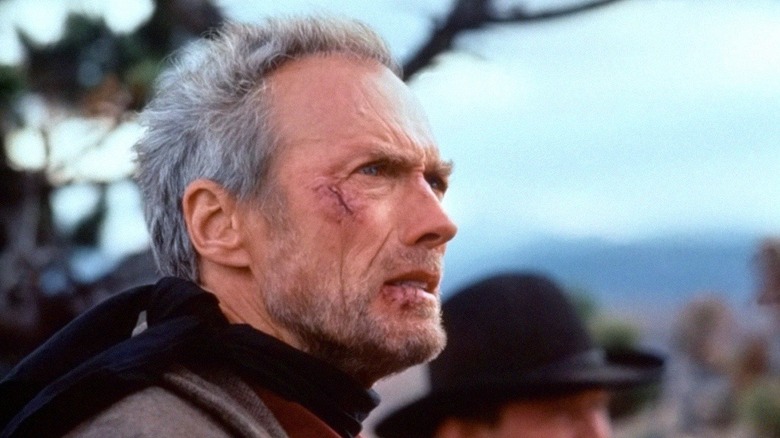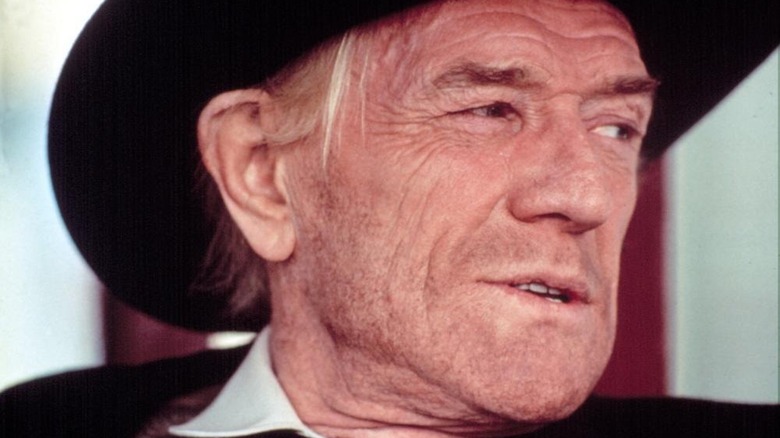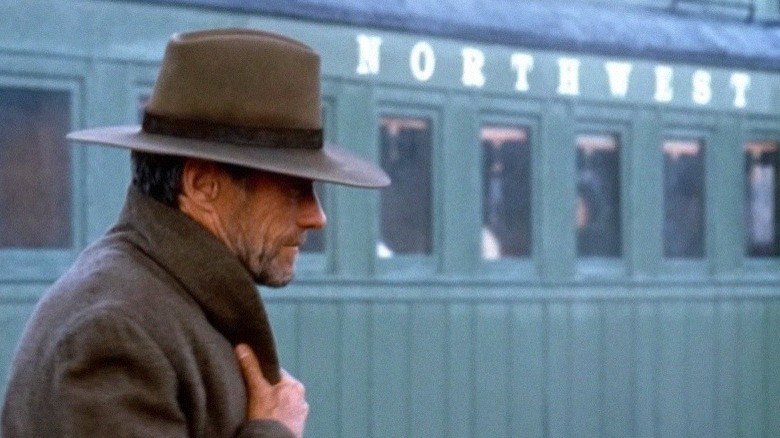The Untold Truth Of Unforgiven
Now and then a rare film comes along which breathes new life into a stale genre, reinvigorating it and dragging it boldly into an exciting and unexpected direction. Clint Eastwood's "Unforgiven" didn't just break every rule of what a Western could be, but it completely reinvented the genre. The 1992 revisionist masterpiece had little time for the romanticized, sanitized version of the Old West which had proved so endlessly profitable for Hollywood. "Unforgiven" had no traditional, clean-cut and morally impeccable heroes in white hats or scowling, snarling villains in black hats. What it did have was a motley collection of flawed human beings who were products of their environment, victims of circumstance, and trying to hopelessly navigate their way through the birth pangs of a nation.
The four-time Oscar-winning epic struck a chord with both critics and audiences alike. It tackled the myth of the Old West head-on and served up a slice of reality that was hard to digest but fiercely engaging to watch. The movie's themes of violence, retribution, regret, and the need for forgiveness were poignantly embodied in William Munny, and the character of the gnarled old outlaw fit Eastwood like a glove. There's no redemption arc for Munny, or light at the end of the tunnel. Violence defines him, governs him, and won't relinquish its grip on him. As he growls ruefully near the film's end, "I've always been lucky when it comes to killing folks." Here's what you may not have known about "Unforgiven."
Francis Ford Coppola nearly directed it
Every frame of "Unforgiven" is overshadowed by the presence of Clint Eastwood as both director and actor. The movie can be interpreted as a goodbye love letter to the genre that made him famous, and as a poignant tribute to his Man with No Name character. By dedicating the film to Sergio Leone and Don Siegel, Eastwood appeared to be closing a chapter in his life and moving on. It's almost blasphemous to imagine any other director, no matter how established or talented, directing it. Yet according to Cinephilia and Beyond, the script, which was penned by "Blade Runner" co-author David Webb Peoples, was originally optioned by Francis Ford Coppola.
After Coppola expressed interest, he couldn't raise the money to develop the project any further. A copy was sent to Eastwood but it was years before he picked it up and read it. Liking it immediately, he set about obtaining the rights from Coppola. Peoples told the Los Angeles Times, "Francis would have done it brilliantly as he does everything else, but it's hard to imagine anyone making it as straightforwardly and uncompromisingly as Clint." Peoples also praised Eastwood for his uncompromising vision in keeping "Unforgiven" dark and moody as opposed to bland and accessible. He added, "'Unforgiven' was Clint Eastwood saying, 'This is what I'm going to do...get out of my way.'"
David Webb Peoples wrote the script in 1976
To say that "Unforgiven" had a long gestation period is something of an understatement. David Webb Peoples wrote the script in 1976 and had to wait until 1992 before it appeared onscreen. When asked by the Los Angeles Times why it took 16 years to get "Unforgiven" off the ground, Peoples explained that after Coppola optioned it in 1984 and failed to get backing, Eastwood picked it up in 1985. Yet for years the script lay dormant until Eastwood decided the time was right to reinvent the wheel and make the Western to end all Westerns.
In Tim Grierson's "Filmcraft: Screenwriting," Peoples explained that he'd always been attracted to revisionist Westerns, such as "The Great Northfield Minnesota," as opposed to the John Ford style of gunslinger action. It was Martin Scorsese's 1976 classic "Taxi Driver" that proved to be a big inspiration for "Unforgiven." He explained that scriptwriter Paul Schrader "opened up the world with that movie" because, before that, he viewed any killing in movies as having a James Bond-type of unreality to it. He added that "Taxi Driver" changed the landscape because "people are getting killed, and the characters maintained how they would be in real life. But at the same time, it's an entertaining movie."
Clint Eastwood was told the script was trash but loved it and barely changed it
"Unforgiven" is widely regarded as one of the best movies of all time for a reason. Its direction, pacing, acting, and script are all on point and neatly trimmed of every single inch of excess fat. Which makes it surprising that in January 1984, long-time Clint Eastwood associate and co-writer of "The Outlaw Josey Wales," Sonia Chernus, sent Eastwood an internal memo throwing nothing but shade on David Webb Peoples' script.
You can view the original memo, in which Chernus's venomous dislike of the script is palpable, at The Clint Eastwood Archive. Confessing that she only read the first 40 pages — which she claims made her ill — before skimming the rest, Chernus writes that she doesn't even care how it ends. Calling the script "trash" and an "insult," she criticizes it for what she calls an absence of believable characters and accuses Peoples of lacking a basic understanding of dramatic writing.
The director, however, thought differently. In an interview with DGA, Eastwood revealed that he thought the script for "Unforgiven" was great in its original form. At first he asked Peoples to make a few changes, but soon realized that the more he tinkered with it, the more he was in danger of stealing its thunder. Eastwood recounted that he called Peoples and said, "Forget what I said about making those changes. I'm not doing anything except changing the title."
Clint Eastwood waited until he was old enough to play the lead
The character of William Munny could never have been played by a fresh-faced young actor. It calls for a certain gravitas, an air of regret, and a haunted melancholy that can only come after a lifetime of experience. Munny is a hunched figure who carries the weight of a terrible history on his shoulders and he is forever squinting into the distance as if he still can not comprehend the unrelenting brutality of an indifferent world. To make the character of Munny both plausible and convincing, Eastwood knew that it called for an actor who carried the lines of age and experience on both his face and soul.
During a speech to the American Film Institute, Eastwood explained that he decided to sit on the script until he was old enough to take the lead. He revealed, "In about 1990 I realized, I've still got this script in a drawer, maybe I ought to take it out and look at it before I get too old to do it." Eastwood said he re-read it, remembered why he loved it, and it was all systems go. In an interview with A Word On Westerns, Frances Fisher, who plays Strawberry Alice in "Unforgiven," recalled that Eastwood's initial musings that he was too young to do justice to the role of Munny were spot on. Fisher said that by keeping it on the back burner for so long, Eastwood was able to play Munny at the perfect time in his life.
Clint Eastwood originally thought Little Bill was the hero
Gene Hackman won both a BAFTA and an Academy Award for the role of Little Bill Daggett in "Unforgiven." Hackman captures the insecurity, ego, and bully-boy nature of a power-hungry sheriff in a small town to perfection. Little Bill is the proverbial big fish in a small pond. He swaggers around, lays down the law, and relishes the opportunity to beat the living hell out of bounty hunters such as English Bob (Richard Harris). There's a suggestion that Little Bill has a past every bit as tainted and tarnished as the "bad men" he brags about going up against. However, with a badge and the full weight of authority behind him, Little Bill carries himself with an air of moral outrage. Yet during the brutal torture and death of Ned Logan, Little Bill slowly reveals that he is something altogether more heinous than any outlaw.
Clint Eastwood explained in his speech to the American Film Institute that upon first reading the script, he thought Little Bill was the hero of "Unforgiven," until the character began to show his true colors. Eastwood explained, "Even though he (Little Bill) was the villain of the piece, he had a point of view, he thought he was right, and doing the right thing." As Little Bill says just before William Munny sends him to hell, "I don't deserve this! To die like this! I was building a house!" To which Munny replies with an existential fatality, "Deserve's got nothing to do with it."
Gene Hackman was reluctant to play Little Bill
Turning down the role that would win you an Academy Award seems crazy. But before pulling on the boots of Little Bill and pinning the sheriff star to his chest, Gene Hackman had reservations about playing the lawman who made his own rules and believed his own hype. Little Bill wasn't just a million miles removed from the archetypal Western sheriff governed by an inflexible code of honor, he was also a keen exponent of using extreme violence to get what he wanted. It was this violence that initially led to Hackman having second thoughts about playing Little Bill.
Hackman was no stranger to playing a rough cop, as his Academy Award-winning turn as Popeye Doyle in William Friedkin's "The French Connection" proves. But Hackman had a particular reason for being reluctant to play Little Bill. "Unforgiven" scriptwriter David Webb Peoples told the New York Daily News that Hackman's daughters were upset at their father for appearing in so many violent films. Peoples explained, "Gene's daughters didn't like all the violent movies he was doing. He was at a stage in his career where his family was more important than his work." Yet with the natural thespian's instinctive eye for a role too good to turn down, Hackman signed on the dotted line and history was made. Peoples added, "God bless Gene, he listened to Clint and together they produced something awesome."
Big Whiskey was built from scratch in Canada
The town of Big Whiskey has an authentic look that effortlessly transports the viewer back in time to an era when the living was hard and the dying was easy. Yet despite looking like the real deal, the town that Little Bill rules with an iron fist was built from scratch in Alberta, Canada.
Frances Fisher explained to A Word On Westerns that "Unforgiven" production designer Henry Bumstead wanted to build Big Whiskey "in the middle of nowhere," with none of the trappings of 20th century civilization. Fisher added, "When we went out to the set it was as if we were back in time. From every direction, you could see nothing but mountains and plains." Situated 60 miles from the city of Calgary, which was the nearest outpost of modern life, Big Whiskey was definitely a town you didn't want to upset the locals in.
According to Esquire, "Unforgiven" also marked the first time Eastwood had shot a film in Canada. Cinematographer Jack Green explained that the Canadian filmmaking union was so keen for the director to make a movie in their country that they were willing to waive certain restrictions on foreign workers. A deal was struck where Eastwood could bring his regular crew of 50 to 60 people as long as they had worked on five previous films with the director.
Clint Eastwood wears the same boots that he wore in Rawhide
January 9, 1959, was a turning point in Clint Eastwood's career. The television premiere of the Western show "Rawhide" introduced the world to Eastwood in the guise of Rowdy Yates. Before his seven-year stint as the show's most popular cowboy, Eastwood had been just another struggling B-movie actor. "Rawhide" changed everything. Without it, there probably would have been no Man With No Name, no Josey Wales, and no William Munny. According to Clint Eastwood.net, the star eventually became disillusioned with the character of Yates because he wanted to play a darker, more troubled character. That opportunity arrived with Sergio Leone's "A Fistful of Dollars."
In a nod to the pivotal role "Rawhide" played in his career, William Munny in "Unforgiven" wears the very same boots that Rowdy Yates once wore (via Classic Country Music). Prior to the release of his 2021 neo-Western, "Cry Macho," "Unforgiven" was often hailed as Eastwood's swan song to the genre which made him famous. In an interview with Feature Story, Eastwood revealed that alongside his "Rawhide" boots, he still has the iconic poncho he wore in Sergio Leone's trilogy of spaghetti Westerns. He admitted that it has never been washed and explained, "It was folded up after 'The Good, the Bad and the Ugly,' and it hasn't been unfolded yet."
There are tombstones for Don Siegel and Sergio Leone in the film
Don Siegel and Sergio Leone were instrumental in Clint Eastwood's career. Playing both a cowboy and a cop, he excelled under their direction at creating anti-heroes that have earned a place in cinematic history. The character of William Munny builds upon the Eastwood mythology that both Siegel and Leone had a hand in creating, so it's no surprise "Unforgiven" is dedicated to both directors. Yet Eastwood also immortalized the two men in the movie by inscribing their names on cemetery tombstones featured in the film.
Eastwood explained on Inside the Actor's Studio that the tribute was his way of "having a little fun with those guys. I wasn't wishing anything upon them." Even though Eastwood described the pair as mentors, he explained that there was no real significance to carving their names in stone. He couldn't leave the tombstones blank, without any inscription, so Siegel and Leone fit the bill perfectly. In Leone's case, however, it could have been a little lighthearted payback for when Leone was asked to compare Eastwood and Robert De Niro in a 1984 American Film interview and said, "Eastwood moves like a sleepwalker between explosions and he is always the same — a block of marble. Bobby, first of all, is an actor. Clint, first of all, is a star. Bobby suffers, Clint yawns."
Richard Harris used Irish history to inform the role of English Bob
One of the most memorable and engaging characters in "Unforgiven" is the silver-tongued, snake-eyed, and black-hearted English Bob. Clint Eastwood revealed on Inside the Actor's Studio that when he telephoned Richard Harris to offer him the part, the actor was actually in the middle of watching Eastwood's "High Plains Drifter." To prepare for the role of a savage killer who hides behind the veneer of a sophisticated dandy and cultured gentleman, Harris revealed he used his extensive knowledge of Irish history. Speaking with interviewer Jimmy Carter, Harris explained he was familiar with the character of English Bob and "that type of Englishman, because they festooned my nation like for 500 or 600 years."
Harris likened English Bob to the Black and Tan constables who were sent from Britain as reinforcements during the Irish War of Independence and who had a brutal reputation for violence. Harris explained that when it came to upholding English rule in Ireland, the British ruling class engaged the services of criminals like English Bob to do their dirty work for them. Upon reading the script, Harris asked Eastwood if he could play English Bob as an upper-class charlatan whose mask finally slips after being beaten by Little Bill, allowing the audience to see the low-life lout behind the facade. Harris admits he got a little nervous about pulling the role off, but Eastwood's encouragement helped him through it.
Unforgiven almost killed off the Western genre
"Unforgiven" wasn't just another in a long line of Westerns: it was almost the final nail in the lid of the genre's coffin. William Munny is a gunslinger who goes against all conventions of what an outlaw should be. Instead of dying in a hail of bullets or riding off into some mythological sunset, Munny has to battle with the most powerful enemy of all — time. Riddled with regret, haunted by past wrongs, and failing spectacularly as a farmer, Munny cuts a pathetic figure. Violence has corroded his soul so deeply that — to his dismay — it remains the only act that allows him to re-engage with his true self. "Unforgiven" lays waste to both the notion of the cold killer without a conscience and the hero who can atone for his past sins.
Westerns have always relied to a certain extent on a romanticized mythology of the Old West. "Unforgiven" refuses to accommodate anything but cold, hard reality. The killings are barbaric and designed to make the viewer confront the senseless and terrible waste of life involved. There are no heroes, no happy endings, and no redemption for villains with hearts of gold. Clint Eastwood explained in an interview with Entertainment Today, "I wanted to not only deconstruct, but take the Western in a different direction." The Western would take a long time to recover in the wake of "Unforgiven," and when it did, it would never be the same again.
